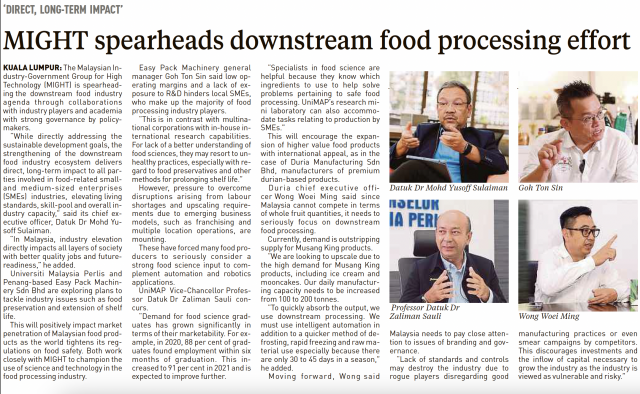
KUALA LUMPUR: The Malaysian Industry-Government Group for High Technology (MIGHT) is spearheading the downstream food industry agenda through collaborations with industry players and academia with strong governance by policymakers .
“While directly addressing the sustainable development goals, the strengthening of the downstream food industry ecosystem delivers direct, long-term impact to all par-ties involved in food-related small-and medium-sized enterprises (SMEs) industries, elevating living standards, skill-pool and overall industry capacity,” said its chief executive officer, Datuk Dr Mohd Yusoff Sulaiman.
“In Malaysia, industry elevation directly impacts all layers of society with better quality jobs and future readiness ,”he added.
Universiti Malaysia Perlis and Penang based Easy Pack Machinery Sdn Bhd are exploring plans to tackle industry issues such as food preservation and extension of shelf life.
This will positively impact market penetration of Malaysian food products as the world tightens its regulations on food safety. Both work closely with MIGHT to champion the use of science and technology in the food processing industry.
EasyPack Machinery general manager Goh Ton Sin said low operating margins and alack of exposure to R&D hinders local SMEs, who makeup the majority of food processing industry players.
“This is in contrast with multinational corporations with in-house international research capabilities. For lack of abetter understanding of food sciences, they may resort to unhealthy practices, especially with regard to food preservatives and other methods for prolonging shelf life.”
However, pressure to overcome disruptions arising from labour shortages and upscaling requirements due to emerging business models, such as franchising and multiple location operations, are mounting.
These have forced many food producers to seriously consider a strong food science input to complement automation and robotics applications.
UniMAP Vice-Chancellor Professor Datuk Dr Zaliman Sauli concurs .
“Demand for food science graduates has grown significantly in terms of their marketability. For example, in 2020, 88 percent of graduates found employment within six months of graduation. This increased to 91 percent in 2021 and is expected to improve further.
“Specialists in food science are helpful because they know which ingredients to use to help solve problems pertaining to safe food processing. UniMAP’s research mini laboratory can also accommodate tasks relating to production by SMEs .”
This will encourage the expansion of higher value food products with international appeal, as in the case of Duria Manufacturing Sdn Bhd, manufacturers of premium durian-based products.
Duria chief executive officer Wong Woei Ming said since Malaysia cannot compete in terms of whole fruit quantities, it needs to seriously focus on downstream food processing.
Currently, demand is outstripping supply for Musang King products.
“We are looking to upscale due to the high demand for Musang King products, including ice cream and mooncakes. Our daily manufacturing capacity needs to be increased from 100 to 200 tonnes.
“To quickly absorb the output, we use downstream processing. We must use intelligent automation in addition to a quicker method of defrosting, rapid freezing and raw material use especially because there are only 30 to 45 days in a season,” he added.
Malaysia needs to pay close attention to issues of branding and governance . “Lack of standards and controls may destroy the industry due to rogue players disregarding good manufacturing practices or even smear campaigns by competitors. This discourages investments and the inflow of capital necessary to grow the industry as the industry is viewed as vulnerable and risky.”

